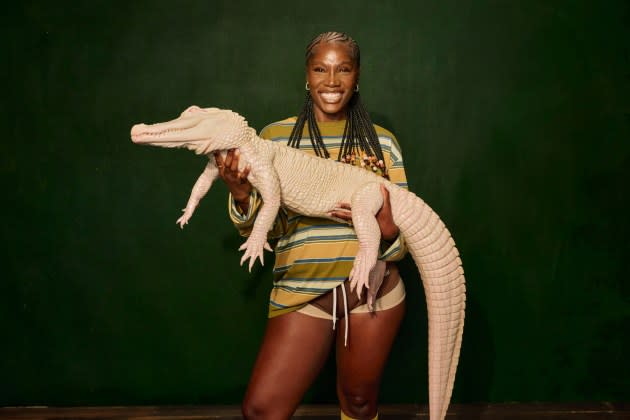Doechii Reigns Supreme on ‘Alligator Bites Never Heal’

Doechii — a fierce and fearless lyricist with a natural ability to shape-shift — became Top Dawg Entertainment’s first female rapper right on the heels of Kendrick Lamar’s departure from the label. That could have set her up to be an heir to an impossibly gilded throne. It would make sense to look at her that way. The expanse of talented rappers left on the roster are Lamar’s friends who have solidified their own domains, too established in those roles to take such a vaunted spot. Though Doechii’s signing was preceded by young Long Beach rapper Ray Vaughn’s, she quickly garnered a broader audience with the viral hits “What It Is (Block Boy)” and “Yucky Blucky Fruitcake” — one a sexy, sung homage to early-aughts R&B with a sample of TLC’s “No Scrubs,” the other a hybrid of high-energy schoolyard bars and raps over dreamy Nineties hip-hop. She quickly crafted opening-act slots on tour with SZA and Doja Cat into major moments, crushed Coachella, and got loved on by women across Black music, from Janelle Monáe to JT of the City Girls. With SZA currently standing as the toppest of the dawgs on TDE’s roster, it’s fair to wonder if she and Doechii will shape the future of the label’s prestige.
Yet, with her full-length debut, Alligator Bites Never Heal (a gesture to the Florida roots of the self-proclaimed “Swamp Princess”), she makes herself more than a successor. She’s a fully realized artist, with immense technical and curatorial skill. (This is one of the only recent albums that deserves to be 19 tracks long.) On it, she slickly glides from gritty boom-bap, sensual electronic, dance music, Miami jook, and earnest soul with a wicked pen and brilliant charisma. Her varied vocal tics and beat selections are often akin to Lamar’s — like her creeping and nefarious “Skipp,” which plays like a spawn of Untitled Unmastered’s tracks two and seven — but she also sounds like as much a student of A Tribe Called Quest, Missy Elliott, and Nicki Minaj.
More from Rolling Stone
Michael Rubin Confirms His All-White Party Playlist Was a 'Not Like Us'-Free Safe Space for Drake
Haley Joel Osment Thinks Kendrick Lamar Mistook Him for Joel Osteen on Purpose: 'He's Too Precise'
She’s also just a human being, and most often she simply sounds like Doechii. This is a feat of originality for someone so early in her mainstream career. The standout is “Denial Is a River,” in which Doechii gives an Oscar-worthy performance as both herself and a therapist of sorts in an immaculate display of her quirks, relatability, and tenderness. She dishes on her depression and failed relationships, and defends a pesky drug habit she picked up in Hollywood, before blasting into “Catfish,” an assertion of why she made it there. Doechii can be brash, reckless at the mouth, and dizzyingly dexterous, but her gentle heart is at the mixtape’s core — her fears, vices, and dreams as she becomes who she always knew she could be are at the center.
Early on Alligator Bites, she seeks to settle any debate about her rap bona fides, with track after track of hardcore spitting on beats that sound like they were plucked out of hip-hop’s golden era and had the dust blown off them. Yet, on the sarcastic single “Boom Bap,” complete with retro scratching by her touring DJ, Miss Milan, she pokes fun at the idea that her ability to skate like that is what makes her worthwhile. After making fart noises into the mic and peppering the song with deeply unserious scatting, she says, “Get Top on the phone/Tell him it’s all rap, nigga.” It’s a rather brazen evocation of her label head and a nod to Lamar’s Untitled Unmastered itself. “Say it’s real and it’s rap and it boom and it bap and it bounce and it clap and it’s house and it’s trap – It’s everything! I’m everything!” she screams.
Throughout the emotional journey of Alligator Bites, she confronts the expectations of her label as a major source of strife for her (without exactly differentiating between TDE and Capitol Records, where she is also signed). She bemoans that they’re “always up my ass like anal beads” and pushing her toward “TikTok music,” but also shows reverence: “Who’d-a got the ball from Big Moo,” she says of current TDE co-president Moosa Tiffith, who signed her, “and who’d-a dunk it?” Later, at the end of “Profit,” where she raps, “My label hate the direction I’m going, they knock my shit,” there’s a recording of a call between the two of them. “I just wanna tell you that I’m proud of you,” Tiffith tells her. “I love you, like, talk your shit, go crazy. I mean, go be the icon that you are.” It feels familiar, like the historically contentious but fruitful relationship between SZA and her manager and TDE co-president Terrance “Punch” Henderson, and you see what magic has come of that. Here, the result is one of the year’s very best albums.
Best of Rolling Stone